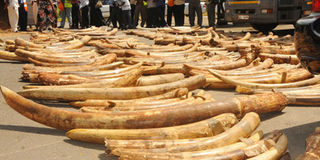DNA technology to aid anti-poaching war

PHOTO | FILE Seized ivory in Mombasa.
What you need to know:
- Elephant poaching now attracts hefty fines. Offenders can also be jailed for life
- Elephant tusks grow ring by ring and the ivory shows what plants the animals eat over time and these plants would have absorbed radioactivity in the air that can act as markers for all those meals
The fight against poaching is set to go hi-tech with the introduction of a tracking system that can link recovered ivory to an elephant carcass through chemical analysis.
The technology is being researched on by scientists from Kenya and the US, says a report released on Tuesday.
Elephant poaching now attracts hefty fines. Offenders can also be jailed for life.
The report says Kenya Wildlife Service experts had teamed up with scientists from the University of Colombia University, the University of Arizona and a local non-governmental lobby, Save the Elephants, to work on the project.
Elephant tusks grow ring by ring and the ivory shows what plants the animals eat over time and these plants would have absorbed radioactivity in the air that can act as markers for all those meals.
“The radiocarbon travels up the food chain, finding its way into the fingernails, hair, teeth and tusks of herbivores. By comparing radiocarbon levels in those tissues against the ever-diminishing amount of radiocarbon in the atmosphere — the “bomb curve” — forensic scientists can pinpoint when the tissue formed, and in some cases, when the animal died,” the report says.
The finding would then be used to establish any link with recent elephant deaths via use of DNA technology, says the report.




